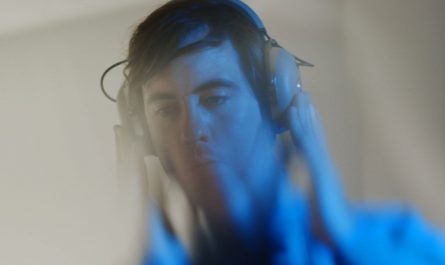We are supposed to be invincible on our birthdays. I believe, childishly, that we become Starmen who are impervious to harm for 24 hours. Yet, on the evening of March 15, 2023, high off of a shit ton of shrooms, Jireh is alone. No family or friends compiled in his home, lilting “happy birthday” off-key as his full moon eyes glint at the light atop the iridescent colored clay molded into numbers, as everyone asks how big he’s grown. Instead, it’s mid-March in Baton Rouge, unnaturally cold and soundless. His back door is open, and spilling beside it lays Jireh, whose flesh dissolved beneath him on his living room floor, partly deformed like an ice cube: congealed and leaking. As is, he’s a hazard—a damp spot on the floor. As is, he’s lonely—precisely what he sought and spiraled off his desired result. The plan wasn’t to die there in his living room. He planned to resolidified himself off the floor, and drive aimlessly. The kind of drive where you go for clarity and disappear in full.
These feelings didn’t come from nowhere. There are moments in our lives when all we want is the attention of those we love during our celebration. Where ascension is in place, a simple “I’m proud of you” is enough; Presence and affirmations are acceptable forms of legal tender.
His first New York trip of 2023 was supposed to be his graduation. His debut album, A Guide 2 Recognizing Your Saints, was supposed to be his moment of vindication. The now archived Instagram photos of bodies smiling and clutching each other after his listening party painted a perception that received this. But really, Jireh got neither. Friends who accompanied him on the trip weren’t fully engaged. A past lover made a promise to show her support. When the day came, she never showed up. On that trip, they all let him down, one way and another. Resentment boiled but never spilled, and like most cold wars, words stand fettered by the tongue out of fear of escalation.
“That was the most alone I’ve ever felt, alone and unsupported.” Jireh says over his screen. “like there’s a difference between being alone and lonely, and a nigga was lonely. And it was I who wanted people to show up for me; I was begging them to show up for me.”
Once he returned to his home, Jireh commenced the soft launch of slowly disappearing for a week to disappear in full that night. Before Jireh could drive off to his death, the body’s “end of life” rally, staving off the reaper, made him reach for his phone and call his mother. The call came on instinct, but his mother begged him to stay on the line until she arrived. As she went inside, her son was still in his living room, as ordered. They prayed together; she prayed for him. He spoke of the disappointment and fear that consumed him; she listened until his high wore down. As he became whole and his weight grew, she became his pillar and held him up as she walked him to her car. That night, a mother saves her son. However, the real work to ensure safety must come from within.
Calling in from his living room, the Jireh before me on this Zoom call appears in bundles, wearing a black and yellow jacket with a cross stitch at the neckline and a camo hoodie bursts from underneath it, running stiffly along his skull, binded by a yellow durag. He’s in a bit of an apologetic mood. He’s only a couple of minutes late for our interview, yet he’s remorseful “The time difference is fucking me up,” he tells me, fidgeting with the cross-stitch of his hoodie as if he were tuning a guitar. Now that his profile has grown, the professionalism needed is also different.
There’s a yawning excitement in Jireh’s husky baritone, a lingering high that comes with a delicate withdrawal. Fresh off his first-ever SoFar Sound performance, he performed a blend of singles from his two projects of 2023, AG2RYS, and his most recent album, B-Sides. In a YouTube video of his performance, Jireh looks comfortable where he is. Dressed in khaki jeans and a jean jacket rolled up on the sleeves that is still a smidge too big for his frame, he sways in place for most of the video, mic in hand. Known for his brutal delivery and compact cadence, Jireh rarely sets a scene or zeros in on details. It’s an unforgiving flipbook animation where, once it starts, you can rewind to the beginning. Distractions are costly. But that night, he waned his pace a bit to comfort others.
I’m just glad she answered.
Suddenly, we shifted from his SoFar show and I ask what made him call his mom that night. Immediately, Jireh’s head hangs limply over the zoom screen as he mouths a few words that come out scratched; then, having to wipe them clean, I ask him if he wants to shift to another topic, and he emphatically denies it. “If I said it, then there must be a reason why I did.” With it, access is granted. He gathers himself, reprising those lost words in total between the pauses. “I don’t even know,” a chuckle appears, masking the relief. “My mom and I have a tumultuous relationship. But I know that something made me call her, and I’m glad I did.” There was a long pause, measuring how much he should say. “I’m just glad she answered.”
Privilege is another type of concession we have no control over, yet we must utilize it when it appears. Jireh’s voice shrinks when speaking about his parents. Personal story beats tethered by transitional phrases and incomplete reflections. His specific experiences are ghost-faint, where details are not always heard but felt. Born and raised in Baton Rouge, Jireh is quick to say that his childhood was no different from any other black child’s experience; black trauma shit, mixed in with teenage angst.
Without going into extreme detail, he’ll tell you that neither he nor his parents tried to understand each other. He’ll tell you that there’s no animosity between them at the moment. They don’t speak often but whenever he travels to a new city to perform, he’ll ask them if they could stop by his house to see if he has any bills waiting for him.
As a child, when things with his parents became dire, his grandmother would always be there with a meal and a caring hand. Here, Jireh opens up more, dazzling indications dripping from his tongue as she speaks on her. From her kindness in picking him up after school to eventually allowing him to move in, her kindness even stretches to his sister, whom the grandmother adopted.
“My sister will tell me about it, but my grandma will make it a point to watch over me.”
Jireh wants to be fair and give them their just due, particularly his father who was a poet and radio DJ. “I would be unable to put words together like I do without that man.” He says. “I wouldn’t be able to read without that man. That man forced me to read and write. Then, at a certain point, he understood that I was naturally gifted at certain things and would force me to do even more. I can’t rob him of that credit for any of that shit.”
A question on the writing process of B-Sides led to Jireh giving his best Tom Green impersonation while giving me a crash course lesson on the Jungian philosophy of shadow work, or as he called it, shadow boxing. From what I gathered, in psychological terms, shadowboxing is the projection of repressed anger. It’s the part of us that we disowned, attaching itself atop the flesh of the people we love. We become unreliable self-narrators who shape a world that makes us feel rejected. It’s where we receive the world’s external wrath for our internal rife.
For a while, he didn’t want to do shit, didn’t want to make shit. Already over-reliant on Shrooms, “My go-to drug for when I’m going through shit,” he went deeper into his addiction. During this time, though, he got heavy into the concept of shadow work.
As he spoke, he rattled off metaphors with his tongue and pulled them back with a wave of his hands until settling on the right one. “It’s like that ant-man movie when he went into that thing. It’s like you go in there. And you don’t know if you come out like you gotta work some shit out in that bitch.” He says. “You got to figure some shit out. And you either come out on the other end or you you stay in that bitch”
“So, what did you learn about yourself?” I ask
“I have boundary issues, bro. I have addiction issues. Like I have, I have addictive tendencies and addictive personality, and that does run in my blood.” He admits. “I have a lot of internal shit that manifests externally. I think I’m in the process of coming up with systems and routines and having the confidence to be as flawed as I am. And like not getting in my way.”
So he ditched the shrooms for the Adderall. He got in touch with a therapist and began to pick himself apart with the guiding ear who’ll remember him to be considerate to himself. He altered how he spoke about himself, particularly his phrasing, to be realistic about his situation and not delve into fatalism. But most importantly, he turned the anger within him into spite. During his recovery, he examined the current landscape for emerging artists and saw how grimy the game is. He grew spiteful towards the algorithm, towards the people who are supposed to be in the know, who don’t know shit, towards artists who compromise their craft for a look, and, most importantly, to life itself.
“I can listen to a song from somebody and immediately know they made it for the playlist,” he says.
There’s something about fun and how intentional we make it. In Jireh’s effort to avoid the stress that comes with intention, B-Side’s sole decree was to be fun—looser, experiment with more sounds and flows, seize the moment, not comb over it.
The project highlight, “Parking,” encapsulates this decree. The slow churning of high hats and kick drums bids a false safety, resonant keys and high-frequency synths wobbling in volume, fighting to keep it all afloat, but ultimately, his compliance to violence is too much. Once Jireh swoops in and says, “Back in this bitch like parallel parking” is said, a trigger, once swelling to be pushed down, will soon be empty. The hook is the most biting; the diction in “Niggas” and “Knowing” at the start of each line is delivered with a brutal sense of disdain. “Niggas down bad and broke/Niggas ain’t making no magic,” is said with disgust.
“I remember making that in my kitchen” talking with his hands as much with tongue. “Just smoking, chilling at the crib and the beat come one and I just did my thing. It was so much fun.”
B-Sides is an album of elongations. But its elongations come in many forms. A bonus offering originally crafted to lengthen the life of his previous album became an entity of its own. Multiple outcomes were possible on his birthday, but a single phone call lengthened the aftershock. There’s also reconstruction. On the cover, you see Jireh standing tall, with his posture straight and face unclothed from his jacket collar, as he stares into the camera. Confident, poised. It is a complete dichotomy to AG2RYS, where he is furled in his seat, elbows broadening his stout frame with only his eyes exposed to the air. Fear.
B-Sides is aware that the right words in any language can render new species out of undying tropes. So instead, it shows the aftermath to those willing to listen. The album doesn’t address the suicide attempt but only hints at the changes that came after. The album intro track, “FYE,” is a re-declaration of dominion with undertones of an adjusted perspective. Immediately, the stakes are high.
The record starts with Birdman’s skit with Druski, eschewing praise with underlying resistance and threats. The bass’s bulkiness is a hand-firm clasp on the shoulder, easing the tension as the sharp, scattered guitar warbles and soft drums spill over graciously. “I ran out of love; now it’s just money,” but as always, he’s curt. Jireh raps in resolutions—the clarity obtained by distance and recollection, ascertaining the value in his craft, and saying how happy he is with his last effort.
Yet, not all of them provide answers or exposure to a problem. On ‘Complicated,’ a woman’s voice glows underneath the rising glow of chords and bass lines. She asks Jireh plainly, “How many things support you being happy?” He laughs, saying, “Now, why you gotta do me like that?” This confirms her suspicions and points out plainly how there’s nothing. The album doesn’t seek to provide closure. It’s meant to show a subtle shift of perception. AG2RYS was an album riddled with loss and doubt. B-Sides is confident, skeptical yet never delving in fatalism.
Accepting all the good that comes with success is a process that Jireh is trying to get right. “I am still having a hard time subscribing to that belief.” The man before me is now leaning back on his chair, chilling as the black jacket that once sat on his shoulders has sunk to the floor. “There’s been enough niggas who have told me that I’m going to be great where I can stop being like, ‘Oh man, thank you.’ I need to start accepting that shit.”
I asked what he felt he had to do to accept his current success. Immediately, he references a conversation with Devin, getting sidetracked by repeating how important he was to him. He caught himself and said consistency.
“Gotta like give people the opportunity to hear your. You ain’t gotta do no crazy shit like getting on TikTok and start dancing on camera every day.” He pauses right there. He let that thought linger for a second and with curt tone he goes, “I’m not dancing in front of a camera ever. You don’t have to worry about that shit, ever.”
Spite is a powerful motivator for living.




